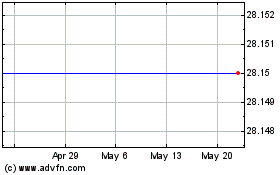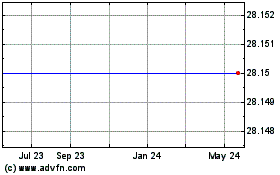Merck/Schering Cholesterol Drugs At Another Crossroads
04 November 2009 - 2:47AM
Dow Jones News
Sales of embattled cholesterol drugs co-marketed by Merck &
Co. (MRK) and Schering-Plough Corp. (SGP) could decline further
after eagerly awaited clinical-trial results are released in
mid-November.
Although the data aren't yet known, some doctors and investors
suspect the "Arbiter 6" trial will show that Abbott Laboratories'
(ABT) Niaspan cholesterol drug was superior to Merck's and
Schering's Zetia at slowing the thickening of the arteries. The
study is to be presented Nov. 16 at the annual scientific meeting
of the American Heart Association in Orlando, Fla.
A negative finding would mean more trouble for Zetia and
Vytorin, which is a single-pill combination of Zetia and the drug
simvastatin. Bernstein analyst Tim Anderson said sales of the drugs
could tumble more than 20% next year to about $3.2 billion--and
that's on top of the 14% decline so far this year due to prior
studies that raised questions about the drugs' efficacy and
safety.
The new data could increase pressure to remove the drugs from
the market, though Anderson said he thinks that outcome is
unlikely. Separate studies last year found that Vytorin was no
better than simvastatin alone at slowing artery thickening, and
that cancer occurred more frequently in Vytorin users than those on
a fake drug. Merck and Schering--which are in the process of
merging--have defended the drugs' efficacy and safety.
Merck shares have dropped 8% since Oct. 20, recently trading
around $30.90, partly in anticipation of negative results for the
latest study.
Conversely, the data could give a "shot in the arm" to Niaspan
sales, said Wells Fargo analyst Larry Biegelsen, predicting
combined sales of Niaspan and two related Abbott drugs will rise
13% to about $1.1 billion in 2010.
At the heart of the matter: There is still no hard evidence that
the reduction in bad cholesterol from use of Zetia and Vytorin
translates into reduction of risk of heart attacks, beyond what can
be achieved by the gold standard of cholesterol drugs, statins. A
negative finding for Zetia in Arbiter 6 would reinforce this
uncertainty and offer up Niaspan--whose active ingredient, niacin,
primarily raises good cholesterol levels--as an alternative.
"If there is a signal that niacin seems better than adding on
Zetia in this study, I think it will really make people think twice
about what their second cholesterol medication is [along with
statins], and I think more people will go with niacin," said
Danielle Duffy, a cardiologist at Thomas Jefferson University
Hospital in Philadelphia.
The study began in November 2006 and was intended to enroll
about 400 people with known cardiovascular disease who were already
taking statins. Roughly half added Niaspan to their treatment,
while the others added Zetia. Researchers compared changes in
thickness of the carotid artery using an imaging procedure after 14
months of treatment.
The study was terminated in June, four months earlier than
scheduled. The lead investigator, cardiologist Allen Taylor of the
Washington Hospital Center, said it wasn't for safety reasons but
has declined to elaborate. Abbott co-sponsored the trial but said
it was conducted independently by Taylor.
The study may have been terminated because Niaspan showed a
clear benefit over Zetia. Some doctors say the trial's design
favored Niaspan, and point to previous Niaspan studies led by
Taylor with positive outcomes.
Merck is playing down the importance of the study. "It would be
inappropriate to draw conclusions about the outcomes from that
study regardless of the result," Peter Kim, head of Merck's
research arm, told analysts during a conference call last
month.
-By Peter Loftus, Dow Jones Newswires; 215-656-8289;
peter.loftus@dowjones.com
Schering Plough (NYSE:SGP)
Historical Stock Chart
From Dec 2024 to Jan 2025

Schering Plough (NYSE:SGP)
Historical Stock Chart
From Jan 2024 to Jan 2025
